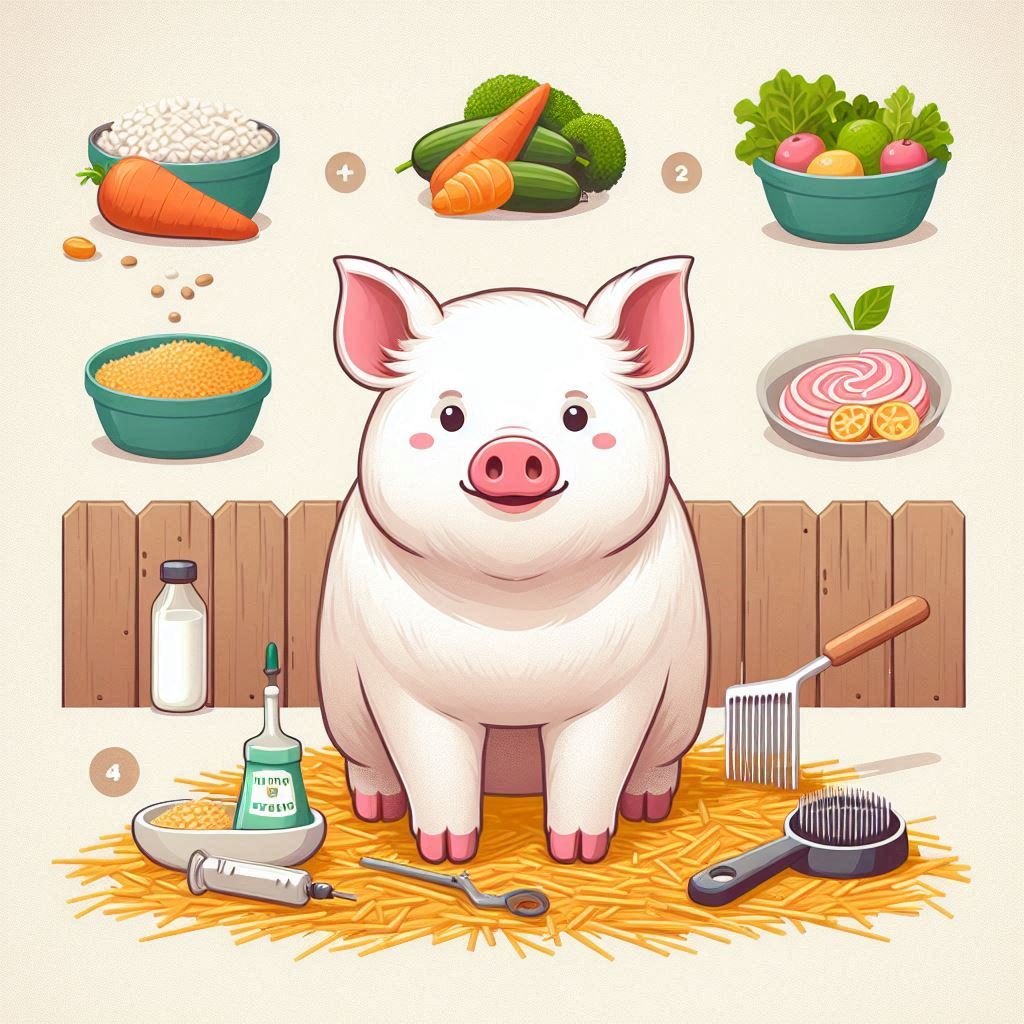So, you’re thinking about getting a pet pig! Pigs are intelligent, affectionate animals that can make fantastic companions. They’re a bit different from the traditional dog or cat, but with the right care and environment, pet pigs can thrive and become a lovable addition to your family.
Caring for a pet pig requires dedication, knowledge, and space. In this guide, we’ll cover all the essential things you need to know to provide a happy, healthy life for your pig.
1. Choosing the Right Pig Breed: Not All Pigs Are “Mini”
The first step in caring for a pet pig is choosing the right breed. There’s a lot of hype about “mini pigs” or “teacup pigs,” but many of these terms are misleading. Most pigs, even small breeds, will grow larger than people expect.
Popular Pet Pig Breeds:
| Breed | Size | Lifespan | Personality |
|---|---|---|---|
| Miniature Potbellied Pig | 90–150 lbs | 12–20 years | Intelligent, affectionate |
| Juliana Pig | 40–80 lbs | 12–15 years | Playful, social |
| KuneKune Pig | 100–250 lbs | 15–20 years | Calm, friendly, enjoys grazing |
| Vietnamese Potbellied Pig | 100–200 lbs | 12–20 years | Stubborn, but loving |
Tip: Always research the breeder and the expected adult size of the pig. Many “mini pigs” grow up to be 100+ pounds, even though they may be small as piglets.
2. Housing: Creating a Comfortable Environment
Pigs need a lot more space than the average pet. They are active and curious animals, requiring room to explore, root around, and be their natural selves. Whether you plan to keep your pig indoors, outdoors, or a combination of both, their living space must be clean, safe, and spacious.
Indoor Living for Pigs
Some owners choose to keep their pigs indoors, where they can interact more easily with their human family.
- Space: A pig needs its own area, such as a large playpen, a room, or a sectioned-off part of the house. Pigs do best in larger spaces and don’t like to feel cramped.
- Pigs can be potty trained: Many pet pigs can be trained to use a litter box or pee pads. Use a large, low-sided container filled with paper pellets or other pig-safe litter.
- Bedding: Provide soft, clean bedding, such as blankets or straw, to create a cozy sleeping area. Pigs love to nest and burrow when they sleep.
Outdoor Living for Pigs
If you plan to house your pig outdoors, they will need a large, secure yard with protection from the elements.
- Secure fencing: Pigs are strong and will root around, so your fence should be sturdy and escape-proof. Electric fencing or reinforced barriers can be necessary for particularly strong diggers.
- Shelter: Provide a dry, insulated shelter where your pig can escape the cold, rain, and sun. A small barn, shed, or pig house works well, as long as it’s draft-free and weatherproof.
- Mud wallows: Pigs love to cool off in the mud. If you live in a hot climate, creating a mud wallow will keep your pig comfortable and prevent overheating.
3. Diet: Feeding Your Pig Properly
Pigs are omnivores, which means they’ll eat a wide variety of foods, but their diet needs to be balanced to avoid health problems like obesity.
What to Feed Your Pet Pig:
- Commercial pig feed: This should be the main part of their diet. Look for high-quality, specially formulated feed for mini or potbellied pigs. The feed should provide the right amount of protein, vitamins, and fiber.
- Fruits and vegetables: Pigs love fresh produce. You can feed them carrots, leafy greens, cucumbers, apples (without seeds), and more. Make sure fruits are given in moderation due to their high sugar content.
- Grains and legumes: Small amounts of grains like oats or barley can be added to their diet occasionally.
Foods to Avoid:
- Dog or cat food: It’s too high in protein and can cause serious health problems in pigs.
- Salty, sugary, or fatty human foods: Pigs can easily gain weight, so avoid feeding them junk food, salty snacks, or processed items.
- Toxic foods: Never feed pigs chocolate, avocados, raw potatoes, or anything with mold.
Water:
Pigs need constant access to fresh, clean water. Use a sturdy bowl or automatic waterer, as pigs can easily knock over lighter containers.
4. Exercise: Keeping Your Pig Active
Pigs are active and intelligent animals, so they need daily physical activity and mental stimulation to stay healthy and happy.
Exercise Ideas for Pigs:
- Free-roaming time: If you have a safe, enclosed yard, let your pig roam and explore for a few hours each day. Outdoor time is essential for both exercise and mental stimulation.
- Interactive toys: Pigs are curious animals, so give them toys to keep them entertained. Balls, treat-dispensing toys, and cardboard boxes can provide hours of fun.
- Rooting areas: Pigs love to dig and root around. Create a designated space where they can root safely without tearing up your entire yard. You can bury treats or toys in the soil or sand to encourage natural foraging behavior.
Tip: Pigs that don’t get enough exercise can become bored and destructive. Keeping them active will prevent unwanted behaviors like rooting in your furniture or tearing up the yard.
5. Health Care: Keeping Your Pig Healthy
Pet pigs need regular vet care just like any other pet. Since pigs are considered exotic pets, it’s important to find a veterinarian who specializes in pigs or livestock animals.
Routine Vet Visits:
- Vaccinations: Your pig will need vaccinations to protect against common diseases like erysipelas and tetanus. Consult your vet about the recommended vaccines for your area.
- Hoof care: Pigs’ hooves grow continuously and may need to be trimmed every few months. If your pig’s hooves become overgrown, it can cause discomfort or difficulty walking.
- Teeth and tusk care: Some pigs, especially males, may develop tusks that need trimming. Dental care is essential to prevent dental issues as your pig ages.
Common Health Issues:
- Obesity: Pigs are prone to becoming overweight, which can lead to health problems like arthritis or heart disease. Monitoring their diet and encouraging regular exercise is crucial to prevent obesity.
- Skin care: Pigs have sensitive skin and can develop issues like dryness, sunburn, or parasites. Use sunscreen if your pig is outside in the sun for extended periods, and keep an eye out for any skin irritations.
- Parasites: Pigs can pick up internal and external parasites. Routine deworming and checking for fleas or mites are important parts of pig health care.
6. Socialization and Training: Bonding with Your Pet Pig
Pigs are incredibly intelligent animals, sometimes as smart as a toddler, and they can be trained similarly to dogs. Socializing your pig from an early age will help them become well-adjusted and comfortable around people and other animals.
Socializing Your Pig:
- Daily interaction: Spend time with your pig every day to build trust. Pigs enjoy being scratched, petted, and even cuddled once they are comfortable with you.
- Introducing other animals: If you have other pets, such as dogs or cats, introduce them to your pig gradually. Pigs can coexist peacefully with other animals if properly socialized.
Training Your Pig:
- Litter box training: Yes, pigs can be litter-trained! Start by placing a large litter box in their living area and guiding them to it after meals.
- Obedience training: Pigs are smart and can learn commands like “sit,” “stay,” and “come.” Use positive reinforcement with treats and praise to encourage good behavior.
- Leash training: Pigs can be trained to walk on a leash, which is helpful for outdoor exercise. Use a harness designed for pigs and start slowly to get them used to the sensation.
7. Grooming Your Pig: Clean and Comfortable
Pigs are naturally clean animals, but they still need some grooming to stay healthy.
Grooming Tasks:
- Bathing: Pigs don’t need frequent baths, but if they get dirty or smelly, a quick rinse with warm water and mild shampoo will do the trick. Make sure to dry them thoroughly afterward.
- Brushing: Pigs enjoy being brushed, especially during shedding season. Regular brushing will help remove dead hair and dirt from their coat.
- Nail trimming: As mentioned earlier, pigs’ hooves need regular trimming. Consult your vet or a farrier if you’re unsure how to do this safely.
Conclusion: Caring for a Pet Pig is a Big Commitment
Pigs are amazing pets for the right owners, but they require time, space, and dedication. With proper care, a balanced diet, regular exercise, and lots of socialization, your pig can become a loving, intelligent companion. Whether they’re snuggling up with you on the couch or rooting around in the yard, a well-cared-for pig can bring years of joy and companionship.
Are you ready to start your pig-parenting journey? If so, remember: caring for a pig isn’t always easy, but it’s definitely rewarding!


